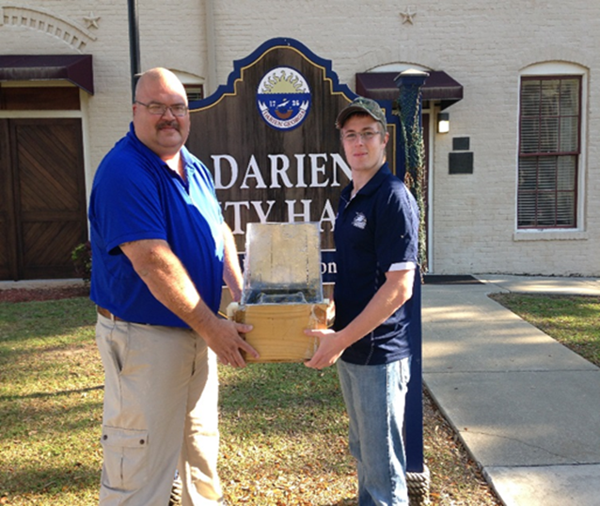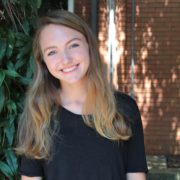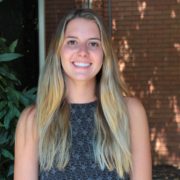CUPP, Clemson’s Newest Outdoor Classroom
By: Jenna Poropatich and Jordin Tedesco
Ask Associate Dean Dr. Bridget Trogden what drives her, and she will answer with little hesitation: service learning. Since relocating from Mercer University to Clemson a mere year and a half ago, Dr. Trogden has channeled this passion and purpose into CUPP (the College/Underserved Community Partnership Program).
CUPP started out as an intention to assist neighboring communities with issues that they could not fix, due to the lack of resources and government funding. Government employee and present CUPP Program Lead, Michael Burns, had the brilliant idea to turn to local universities for help, since he knew the opportunity was consistent with education and could be a great way for students and faculty members to get hands-on experience while making a difference. The program humbly began with four schools in the fall of 2013 and has drastically expanded to over 70 schools spread across 20 states (as of June 2018, from CUPP website).
Today, CUPP’s mission is to bring together the intellectual strengths of college faculty, staff and students with small or underserved communities, by providing vital technical support through student capstones, internships, and creative inquiries. Project ideas are typically initiated by communities, since they are better equipped to identify problem areas and urgent issues within their locale. The college or university is then notified of these potential projects and interested faculty and students have the chance to take them on.
“… (CUPP) starts with the community and ends with the community.” – Dr. Bridget Trogden
Thanks to Dr. Trogden, Clemson University has recently signed on to be a part of the CUPP program. Since Clemson is a campus nurtured by an enduring land grant mission, the University is motivated to move into the status of a modern research institution. With ambitious students wanting to learn more about the sciences, agriculture, and engineering both in and out of the classroom, CUPP is a perfect match for Clemson curriculum. Students are able to receive authentic learning experiences through hands-on partnerships with surrounding rural communities.
“We can impact student learning through authentic kinds of projects. That’s to me the most important – to be able to let you all not just sit in desks and encounter information as someone explains it to you but to be able to encounter the world on your own.” – Dr. Trogden
Through CUPP programs, students get the chance to sharpen their skill sets and get creative. The unique opportunity allows Clemson students to work with community leaders and give them the chance to present their plans and findings back to the community, where the locals can then choose to implement them.
One of CUPP’s major goals is to promote a natural collaboration with several government sectors emphasizing community engagement and support. CUPP displays this through the several partnerships that have been created with organizations such as the US Department of Agriculture, US Department of Energy, US Department of Education, The Thriving Earth Exchange, and the Community Engineering Corps (CUPP website). Due to these collaborative efforts, the CUPP program has been able to complete over 120 different projects through 70 different schools.

A Georgia Southern student and a utilities manager holding a solar cell that will reduce excess water in sewage sludge by 30%.

Students from Georgia Tech conducted a feasibility study on the impact of the Alabama river and the structural supports for the Edmund Pettis Bridge in Selma, AL.
A recent CUPP project identified the community problem of securing public safety officers in the City of East Point in Georgia. A student came up with the idea to assist the city in developing a program to help “fund, rehab, and resale of property to city employees as a retention incentive”. The program would locate habitable vacant houses for employees to live. Homes may need to be restored and brought up to code; however, the program would make sure that the houses are assessed for any environmentally hazardous materials. This project has also expanded to include the framework for the use of federal work study funds to provide stipends to students who were not able to participate in CUPP due to the lack of finances available. By including stipends, students would be able to offset expenses while working on projects to better communities.
Another CUPP project involved Georgia State University students who identified weaknesses in the City of East Point. They did this by conducting a series of interviews and community meetings that helped pinpoint the specific problem. As a result, they developed cybersecurity training as a part of the City’s orientation process for new employees. This training will help employees be more cautious and know how to detect cybersecurity threats, malwares, and viruses. The project has influenced and inspired various cities and countries to adopt the same training program for their new employees. Farhad Islam, East Point’s IT Director stated that “the City of East Point benefited greatly from their work” (CUPP website).
“Something that makes me really proud to work at Clemson, is that everyone believes in the land grant mission. People are not just here to do smart things and get good grades and win football championships. We are here to make the world better. And everyone believes that.”- Dr. Trogden
Clemson University has already gotten the ball rolling for project ideas from the local communities of Central, Pendleton, and Walhalla. Some examples include but are not limited to: designing a fire station, town landscaping and development, development of models for 93 corridors, assisting with road and railroad intersection issues, and grant writing. These are just a few of the many projects students and faculty can take on through the CUPP program at Clemson. These hands-on experiences not only provide students with class credit or academic compensation, but it gives them a chance to actually produce a product for a client.
As the CUPP program continues to expand, Burns hopes to create more funding and develop a larger staff system. By doing so, more outreach is possible, and funding for students to get stipends while working on their projects is more attainable. This could broaden the academic field for potential projects, and lead to students from every discipline finding a project that interests them.
For more information about the College/Underserved Community Partnership Program, contact Dr. Bridget Trogden at trogden@clemson.edu
Written by:

Jenna Poropatich
A year ago, Jenna Poropatich moved from her small hometown of Fort Mill, South Carolina to pursue degrees in Communication, Language and International Trade at Clemson University. Jenna is ecstatic to begin her sophomore year in Tiger Town, and spend her days studying and interning at the Pearce Center. When she is not doing accounting homework or trying to master the French language, she can be found on a run, waiting to board a flight at the airport, sipping on an iced coffee, reading an autobiography, or wearing denim.

